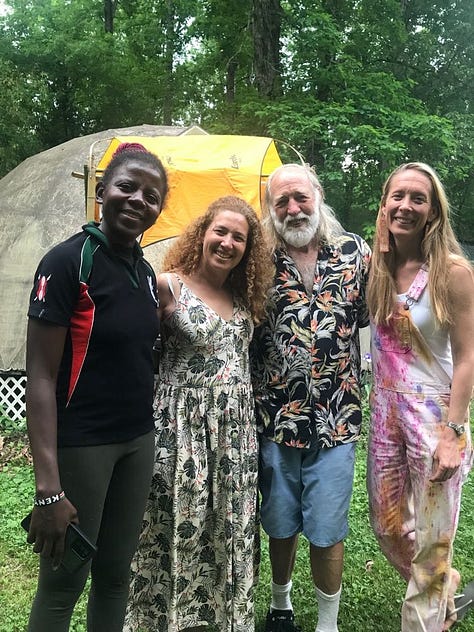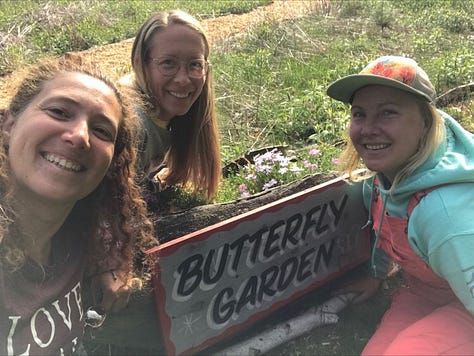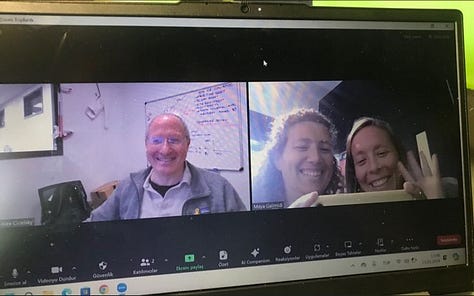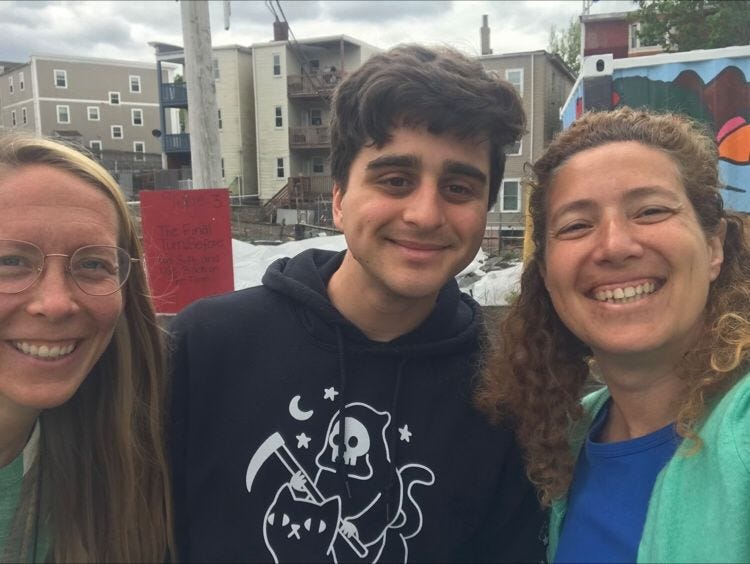This week, we are thrilled to share the latest highlights from the Future of Education tour led by Ashlei Laing and Maya Galimidi. As we journey through different parts of the United States, our mission remains steadfast: to explore and advocate for experiential learning opportunities that enrich education at all levels.
Our recent stop in the lands of the Central Band of Cherokee or modern-day Tennessee marked the completion of an inspiring chapter, and now we are delighted to announce our arrival in N’Dakina the ancestral lands of the Abenaki - New Hampshire and Massachusetts. Along the way, we've had the privilege of conversing, dreaming, breaking bread, and engaging with a diverse array of individuals, including young adults, recent graduates, educators, and members of various community networks.



Currently, we are immersed in the vibrant community of Amesbury, Massachusetts, where we are actively supporting local regenerative garden initiatives. The enthusiasm and passion we've encountered reaffirm a shared desire for more hands-on learning experiences. This sentiment extends beyond traditional higher education settings to encompass K–12 education, adult education, and community-based learning programs.
Throughout our journey, one resounding theme has emerged: the craving for experiential learning. Youth and higher education students alike express a deep interest in immersive experiences, such as community visits, cultural exchanges, and real-world engagements. Understanding life beyond one's immediate surroundings is integral to holistic education.
We firmly believe that experiential learning is not just beneficial; it is essential. It fosters a deeper understanding of the world and equips individuals with the skills needed to thrive and contribute meaningfully and with relevance in society. That's why we are committed to shaping our courses around the principles of hands-on, place-based learning, ensuring that learners acquire both practical skills and a profound sense of connection to their communities and the wider world.
As we continue our journey, we invite you to join us in reimagining the future of education—one experience at a time.
- Ashlei and Maya
---
Given that Maya and Ashlei are pointing to the importance of experiential education (often construed as "learning through reflection on doing"), I thought it would be worth providing some additional resources around experiential education here in this weeks' newsletter. We are writing this at a moment when education is (again) on the front page, and as students across America are asking their Universities to reconsider their values and their actions, this time in regards to the ongoing conflict in Gaza. And when AI is posing huge questions to how we engage in education…. And to what it means to have embodied ethics.
Experiential education is not only about "what" and "why" but also very much "How" humans can best learn. Of course, purpose and process are connected - which is often at the heart of experiential education. Reading about how to start a fire, build a house or harvest vegetables is a limited and in many ways insufficient way of learning: you have to do the thing! which is part of why apprenticeship programs are so important and are one of the longest-standing forms of learning (and teaching).
John Dewey (who might be most famous for his Dewey decimal system but who is also considered one of the forefathers of modern education) is often credited for emphasizing the importance of experiential education, much of which was picked up and developed by John Kolb in the 1970s (he developed the Experiential Learning Model). We can trace the roots of this method much further back. In 350 BC, Aristotle wrote in the Niomachean Ethics that "for the things we have to learn before we can do them, we learn by doing them".
And, to the extent that experiential education centers moving away from the teacher being in the front of the room imparting information, if we look at societies that have never emphasized that particular form of learning to begin with, we find wide approaches and diverse methods of learning-by-doing-and-reflecting. This is especially true in indigenous communities. Indeed, for many indigenous communities, decolonizing their own educational processes can include finding ways of re-incorporating experiential learning into their communities. There is a wide and growing field of thought-action around revitalizing indigenous forms of knowing, including learning, research, and doing.
When looking for different resources on these themes, I was struck by the tremendous breadth through which these methods are being actively used. From Montessori and Waldorf schools for children to STEM courses (first rolled out at Chicago Public Schools) for adolescents to the European Youth Parliament to the Robert H. Smith School of Business (who sends a group of undergraduates on a year-round advanced course of financial analyses and security trades to managing real investment dollars) to a wide variety of outdoor education programs…. There’s a huge range out there! There are contextual learning and case-method-based approaches to learning (which are related). Nonprofits such as Out Teach, Life Lab, Nature Explore, and the National Wildlife Federation, offer teacher training on experiential learning using outdoor spaces; and programs such as Outward Bound have been offering outdoor education for decades. Farmer-field schools (first rolled out in Indonesia by the FAO) were a significant shift from previous forms of learning.
The wide lens touches upon the deeper questions of epidemiology (our ways of knowing) and ontology (our ways of being). Learning and knowing are, of course, related. So questions of ‘how do we do research’ sit side by side with questions of ‘how do we do education’ for all age levels.
Here are a few classics, a few academic pieces, and a few current thought/reflection pieces on these themes.
Berthelette, S. (2023) Reflections on an indigenous place based experiential learning course - a short read sharing exactly as it says. :-)
Concha Delgado Gaitan, "Researching change and changing the researcher," Harvard Educational Review, 63 (4) (1993). - One of the main points of participatory research is that the researcher can change. Not exactly the same as "teaching" and "learning", but how we research is another form of how we learn, and so these conversations are very much connected.
Experiential Learning for Sustainable Development: Ignite India's tailored, place based approach. - This is just one example amongst thousands (millions?) of a experiential learning. A relatively easy read geared for an entrepreneurial, not an academic, reader.
Gaventa, John. 2004. Learning and Teaching Participation: exploring the role of higher learning institutions as agents of development and social change. - an important (though very academic) text in the field of thinking about Higher Educational Institutions. Plus John Gaventa has played some important roles in our own learning, so we like highlighting his work when we can!
Kolb, D. (1984). Experiential Learning: experience as the source of learning and development. Englewood Cliffs, NJ: Prentice Hall. - one of the first books that shaped and keeps shaping this field.
Mary Ann Hinsdale, Helen M. Lewis and S. Maxine Waller, It Comes from the People: Community Development and Local Theology. (Philadelphia, PA: Temple University Press, 1995). - a classic work
Merrifield, J. Knowing Learning and Doing: Participatory Action Research - a classic text in the field.
Moon, J. (2004). A Handbook of Reflective and Experiential Learning: Theory and Practice. London: Routledge Falmer. - this is a big academic book, but if you are in academia, it has some great resources.
Things Fell Apart, S1. Ep 2: Dirty Books. - Part of a BBC documentary on the culture wars. While this is not directly about experiential education, it is an important story about an origin point of the current/ongoing struggle around what textbooks are used in education.
Whang, Oliver. 2023. Can Intelligence be separated from the body? NY Times
If you have any other favorite resources (films, podcasts, reports, case studies, etc.) on experiential education, please do respond to this email and let us know!
Thank you!
Sara Jolena, for the ReMind Newsletter
PS - please feel free to share/forward this newsletter!




